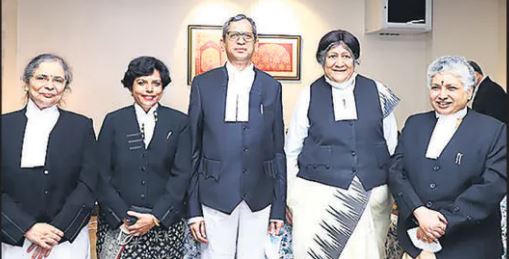New Delhi,
September 28: In a move that boosted the morale of women activists fighting for
reservation in all fields including judiciary for a long time, the Chief
Justice of India N V Ramana, called for an urgent correction of the gender
imbalance in the judiciary to grant 50 percent reservation to women.
In his
keynote address at a function organized by women advocates of the Supreme Court
to felicitate recently appointed judges including three women judges, Ramana
asked the women to come forward and mount pressure on the concerned authorities
demanding 50 percent reservation in all spheres of Indian society. The CJI as
chief guest of the ceremony noted that after thousands of years of suppression,
equal representation is a right of women emphasizing that reservation is not a matter
of charity.
CJI Ramana
also dwelt upon the measly representation of women in the judiciary in numbers,
saying that women make up only 30 percent of the lower judiciary, 11.5 percent
of the high courts, and 12 percent of the Supreme Court. Moreover, only 15 percent of the country’s 1.7 million advocates are women.
“The picture
is worse when it comes to bar councils: only 2 percent of women are elected
representatives in state bar councils and the Bar Council of India has no
female members whatsoever,” Ramana remarked
Dealing with
the problems that women in the judiciary, the CJI said that gender roles are
enforced on women when they choose to become lawyers adding the
dual-responsibility they have to contend with as family responsibilities
inevitably fall on them and a general preference of clients for male advocates pose
significant challenges to women in the judicial system.
Stating that
the environment in the courtrooms is also not favorable for women, Ramana
pointed out that crowded courtrooms and a lack of infrastructure affect women
disproportionately. He said that, out of the 6,000 trial courts in the country,
only 22 percent of them have washrooms for women.
“We need to
create a more welcoming environment,” the CJI noted while referring to the
proposed National Judicial Infrastructure Corporation project which he himself
has envisaged.
Earlier, in
another function, the CJI had also made reference to NJIC saying that the
project will follow the design principles of socially responsible and inclusive
architecture and would work towards creating national assets in the country.
The CJI
supported reservation of seats for women in law schools across the country and
expressed hope that more women will join the profession and achieve the goal of
50% very soon.
Justice B.V.
Nagarathna, who was appointed to the Supreme Court recently and is all set to
become the first woman Chief Justice of India also graced the event and in her
address noted that the visibility of women as judicial officers can pave the
way for greater representation of women in other decision-making positions such
as legislative and executive branches of the government.
Justice
Nagarathna will only serve a term of one month as the CJI. Ramana hoped that
the courts might resume its physical sitting after Dussera vacations that
started early next month. The apex court
has been hearing cases virtually ever since COVID-19 lockdown was imposed last
year, only recently moving to a “hybrid” mode of functioning.
Women face
various obstacles to enter the profession and gender stereotypes force them to
bear the brunt of family burdens.
Ramana’s
reference to Karl Marx evoked curiosity among the gathering mostly women when
he said that workers of the world unite as you have nothing to lose but your
chain.
"Women
of the world unite. You have nothing to lose but your chain. You all are
laughing. Yes, I don't want you to cry but with anger, you have to shout and
demand that we need 50 percent reservation. It's not a small issue but an
issue of thousands of years of suppression. It is high time we have 50 percent
representation of women in the judiciary. You are entitled (to it); it's a
matter of right. It is unfortunate that some things are realized very late,”
the CJI remarked.

